全新版大学英语第二版综合教程3电子教案
- 格式:docx
- 大小:11.75 KB
- 文档页数:2
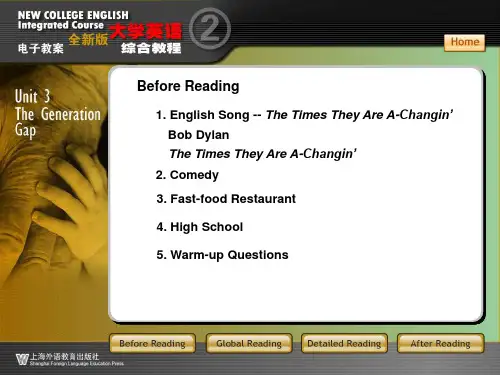

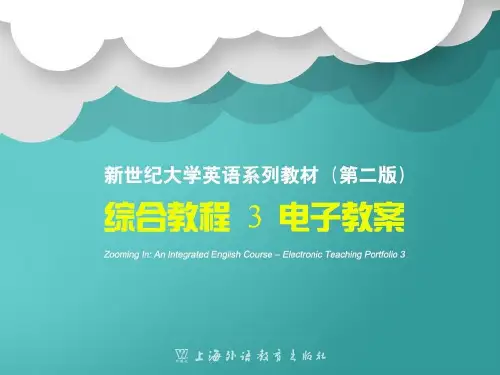
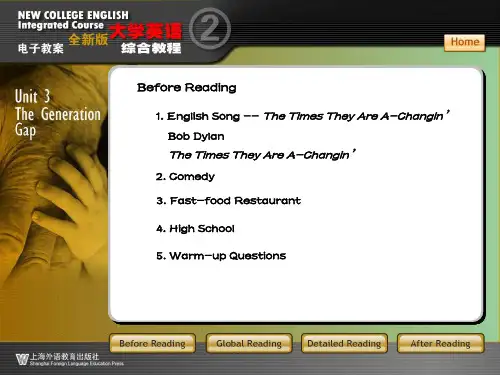
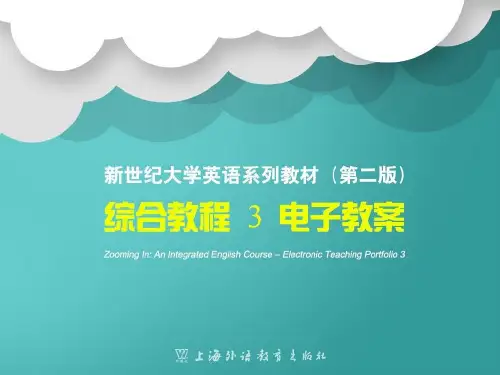
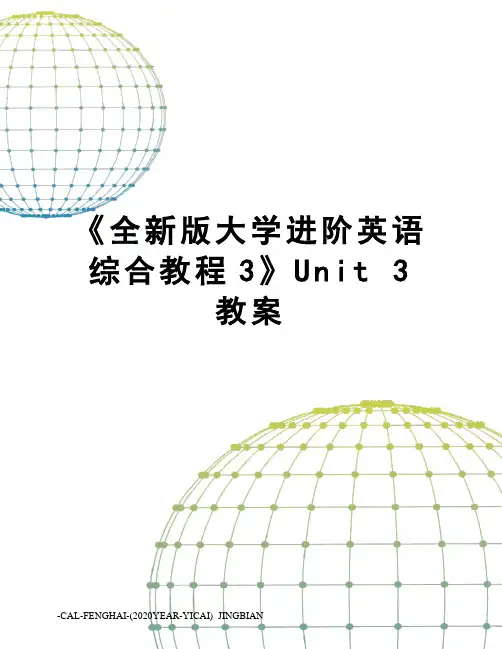
《全新版大学进阶英语综合教程3》U n i t3教案-CAL-FENGHAI-(2020YEAR-YICAI)_JINGBIAN《全新版大学进阶英语综合教程3》课程单元教学设计(教案)编号:U3-01Steps(步骤)教学组织Step One(步骤一)Opener:Pair work: The pictures below compare Westerners (marked in blue) andChinese (marked in pink) in their way of looking at children and the family,travelling, and the role of the boss in an organization. Look at the pictures andwork with your partner to answer the questions that follow.Helpful Expressions接送孩子 drop off and pick up the child风土人情 local customs and culture到此一游 been here, done that高高在上 superiority有权有势 powerfulQuestions:1 In what way does the role of grandparents in Chinese families differ fromthat in Western families?2 In what way do Western tourists and Chinese tourists behave differently?3 In what way do Western and Chinese employees differ in the way they lookupon their boss?Tips in this part:1. Introduce the topic to the class by asking if they can give any example ofhow Chinese and non-Chinese behave or think differently in life.2. Explain the pictures in Opener that illustrate the differences between theWesterners and Chinese in their perspective on different issues.3. Ask Ss to look at the pictures and discuss the differences in pairs with theaid of the questions that follow.4. To sum up, have different pairs report to the class their discussion on thepictures, one pair for one picture.Step Two(步骤二)Video watching:After watching a video clip about an interview with three foreign womenmarrying Chinese husbands, discuss the following questions with yourpartner.《全新版大学进阶英语综合教程3》课程单元教学设计(教案)编号:U3-02《全新版大学进阶英语综合教程3》课程单元教学设计(教案)编号:U3-03《新视野大学英语(第三版)》Book 3课程单元教学设计(教案)编号:U3-04DiscussionDiscuss what you like / dislike about where you live.things you like:a food market; a bookstore; close to the metro; a good hospital / medical care centerthings that are nice but not essentiala good local supermarket; a sports center;a theater / cinema; a barthings you dislike:lacking of parking space; various types of noise; pollution; high crime rateThink about your neighborhood. What would make it:saferLectures should be given to tell people how to prevent fire, theft and other dangers. Besides, the police should make sure the streets are safe –not only from crime but also from traffic accidents.more beautifulI think we should plant more trees and flowers in the community. In addition, we should discipline our own behavior and should not litter garbage everywhere or draw on the buildings.more interestingMore entertainment activities should be held to draw the interest of people. Meanwhile, don’t forget the children. We should also provide them with facilities to give them fun and joy.better for your healthI think we should build a community gym providing a variety of affordable exercise options. Besides, activities should be conducted to help people quit smoking or excessive drinking.more of a communityI’d really like to see a good shopping mall, where people can meet, get to know each other and entertain themselves.。
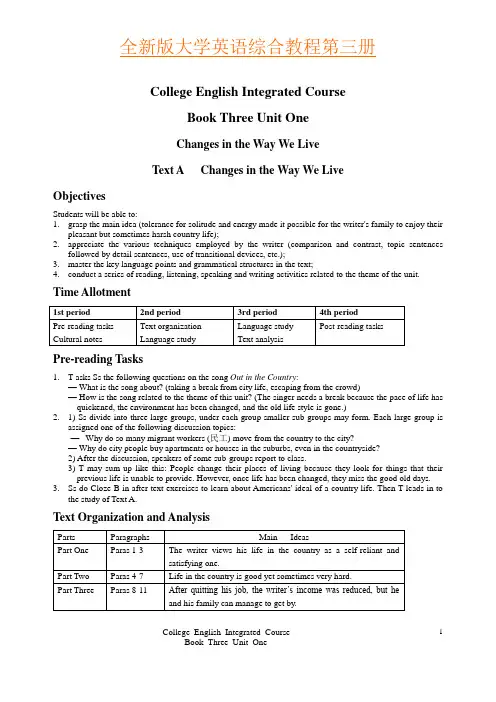
College English Integrated CourseBook Three Unit OneChanges in the Way We LiveText A Changes in the Way We LiveObjectivesStudents will be able to:1.grasp the main idea (tolerance for solitude and energy made it possible for the writer's family to enjoy theirpleasant but sometimes harsh country life);2.appreciate the various techniques employed by the writer (comparison and contrast, topic sentencesfollowed by detail sentences, use of transitional devices, etc.);3.master the key language points and grammatical structures in the text;4.conduct a series of reading, listening, speaking and writing activities related to the theme of the unit. Time AllotmentPre-reading Tasks1.T asks Ss the following questions on the song Out in the Country:— What is the song about? (taking a break from city life, escaping from the crowd)— How is the song related to the theme of this unit? (The singer needs a break because the pace of life has quickened, the environment has been changed, and the old life style is gone.)2.1) Ss divide into three large groups, under each group smaller sub-groups may form. Each large group isassigned one of the following discussion topics:—Why do so many migrant workers (民工) move from the country to the city?— Why do city people buy apartments or houses in the suburbs, even in the countryside?2) After the discussion, speakers of some sub-groups report to class.3) T may sum up like this: People change their places of living because they look for things that theirprevious life is unable to provide. However, once life has been changed, they miss the good old days. 3.Ss do Cloze B in after-text exercises to learn about Americans' ideal of a country life. Then T leads in tothe study of Text A.Text Organization and AnalysisCollege English Integrated Course 1The author writes his piece in a clear and logical way. In many instances he employs the pattern of “one topic sentence + several detail sentences” structure.It’s easy for readers to grasp the main idea, and it is also proven effective for learner writers like our students.Sometimes the detail sentences run parallel to each other, like those in Para 2. In some other paragraphs the detail sentences have their own hierarchy. Take Para 5 for example. The first sentence tells how busy “I” am. The second sentence states that Sandy, the wife, is also busy. The final sentence is a kind of summary—nobody can relax. Yet following the second sentence there are a few more detail sentences showing exactly how tight a schedule Sandy has. Take Paras 12-13 for another example. The topic sentence therein is “I suspect not everyone who loves the country would be happy living the way we do. It takes a couple of special qualities.” Then there are two sub-topic sentences: “One is a tolerance for solitude”; “The other requirement is energy—a lot of it.” Each sub-topic sentence has its own supporting details.Sometimes there is no transitional devices between detail sentences, sometimes there are, the most frequently used one of which is time words or phrases. For example, the detail sentences in Para 4 begin with “three months ago”, “three months from now”, “recently”, and “later this month”, respectively. To be sure, other conjuncti ons scatter the text, like “first”, “then”, “then”, “eventually” in Para 7.Cultural Notes1.the countryside: The countryside of Britain is well known for its beauty and many contrasts: its baremountains and moorland, its lakes, rivers and woods, and its long, often wild coastline. Many of the most beautiful areas are national parks and are protected from development. When British people think of farmland, as well as open spaces, they imagine cows or sheep in green fields enclosed by hedges or stone walls, and fields of wheat and barley.Many people associate the countryside with peace and relaxation. They spend their free time walking or cycling there, or go to the country for a picnic or a pub lunch. Only a few people who live in the country work on farms. Many commute to work in towns. Many others dream of living in the country, where they believe they would have a better and healthier lifestyle.America has many areas of wild and beautiful scenery, and there are many areas, especially in the West in states like Montana and Wyoming, where few people live. In the New England states, such as Vermont and New Hampshire, it is common to see small farms surrounded by hills and green areas. In Ohio, Indiana, Illinois and other Midwestern states, fields of corn or wheat reach to the horizon and there are many miles between towns.Only about 20% of Americans live outside cities and towns. Life may be difficult for people who live in the country. Services like hospitals and schools may be further away, and going shopping can mean driving long distances. Some people even have to drive from their homes to the main road where their mail is left in a box. In spite of the disadvantages, many people who live in the country say that they like the safe, clean, attractive environment. But their children often move to a town or city as soon as they can.As in Britain, Americans like to go out to the country at weekends. Some people go on camping or fishing trips, others go hiking in national parks.2.Fahrenheit scale: a scale of temperature, first established by the German physicist Gabriel Fahrenheit in1715. The unit of temperature is the degree Fahrenheit (°F), and 0°F was originally the coldest temperature Fahrenheit could achieve using a freezing mixture of salt and ice. On his scale, water freezes at 32°F and boils at 212°F (under set atmospheric conditions). No longer used in scientific work, Fahrenheit temperatures still feature in everyday language; hot days "in the eighties", for example. To convert a Fahrenheit temperature to Celsius (centigrade), subtract 32, then multiply by 5/9.3.Celsius scale: a scale of hotness, or temperature, first established by the Swedish scientist Anders Celsius(1701-1744) in 1742. On this scale, the unit of temperature is the degree Celsius (°C); water freezes at 0°C and boils at 100°C (under agreed standard atmospheric conditions), although when Celsius originally devised the scale he made 100°the boiling-point and 0° the freezing-point. The Celsius scale was formerly commonly known as the centigrade scale because of the 100 divisions between the freezing- andCollege English Integrated Course 2boiling-points of water. To convert from degrees Celsius to degrees Fahrenheit multiply by 9/5 and add 32.4.Ivy League: eight long-established colleges and universities in the United States with prestigiousacademic and social reputations. Members of the Ivy League are Brown University in Providence, Rhode Island; Columbia University in New York City; Cornell University in Ithaca, New York; Dartmouth College in Hanover, New Hampshire; Harvard University in Cambridge, Massachusetts; University of Pennsylvania in Philadelphia; Princeton University in Princeton, New Jersey; and Yale University in New Haven, Connecticut. The members of the Ivy League compete in intercollegiate athletics.5.Sports Illustrated: a popular US sports magazine published each week by Time Inc. part of Time Warner.It first appeared in 1954, and is read mainly by men. The magazine also publishes the Sports Illustrated Sports Almanac every year.6.Individual Retirement Account (IRA): a US government plan that allows people to put part of theirincome into special bank accounts. No tax has to be paid on this money until they retire.7.Buying Insurance: People face many choices when buying insurance policies. They commonly choose aninsurance provider based on several criteria. Some of the most important of these include: 1) the financial stability of the insurance company, 2) the price of policies, and 3) details of coverage and service.Only a financially sound company can fulfill its promise to pay in all circumstances. Companies with proven records of stability can provide insurance security. Choice of a provider based solely on price, on the other hand, may result in poor service and coverage, even if the provider advertises comprehensive coverage and high quality service.Policy prices vary significantly among companies, but competition usually forces most companies’ prices into a narrow range. The greater cost of some policies may pay off in the long run through better protection. Thus, a detailed examination of coverage in policies provided by different, well-regarded companies can help consumers make the best choice based on the risks they face, their needs, and their finances.People seeking to buy insurance often use the services of an insurance agent or broker to assist in their purchase. Most insurance falls into four main categories, according to what it covers: 1) property and casualty, 2) life, 3) health and disability, and 4) old-age and unemployment. Insurers commonly refer to insurance purchased by individuals as personal lines coverage and to insurance purchased by businesses as commercial coverage.Language Study1.get by: be good enough but not very good; manage to live or do things in a satisfactory way Examples:My parents managed to get by on a small amount of money.It is a little bit difficult for the old couple to get by on such a small pension.We can get by with four computers at the moment, but we'll need a couple more when the newstaff members arrive.2.... when it was 30 below: Here the Celsius scale is used instead of the Fahrenheit scale, (see CulturalNotes)3.indoor: situated or used inside a buildingExamples: Indoor pollution has been found to be as much as five to ten times higher inside some skyscrapers than outside.Tobacco smoke is considered as an indoor pollutant.The Mall of America, the biggest mall in USA includes the world's largest indoor amusementpark.4.pursue: followExamples: After graduation Martin chose to pursue the same career as his father as a minister.College students are advised to pursue a wide range of subjects.Public evening classes allow people to earn a living during the day and pursue vocational andintellectual interests in their spare time.5.get through: come successfully to the endExamples: The local government has taken some measures to ensure that all the people will get through the winter.She got through the entrance examination and was accepted by the college.College English Integrated Course 36.at that point: at that very moment, right thenExamples: The train was now only a couple of yards from the kids on the track. At that very point, Anthony threw himself forward and pulled them clear .The man suddenly held up a poster. At that point, all TV cameras were pointed at him.7.on balance: with all things consideredExamples: I think, on balance, I didn't treat you unfairly.On balance, it's probably not advisable to change the company's name.8.illustrate:provide with visual features; clarify by use of examples, etc.Examples: Let me use another example to illustrate this difficult point.The editor has illustrated the book with black-and-white photographs.9.I'm not making anywhere near as much money as I did ...: I am not earning as much money as I did ...10.generate: bring into existence, produceExamples: The widespread use of Spanish in some American cities has generated a public debate over language use in the country.Space technology has generated thousands of products for everyday use such as lightweightmaterials used in running shoes.11.insurance: a guarantee that you will receive money if something is lost or damaged, or have repairs paidfor, by a financial company in return for regular payments you make to themExamples: Many nations have some form of compulsory unemployment insurance.People regularly buy insurance to reduce uncertainty and to protect themselves from futuredisasters.12.pick up: be ready to payExamples: If he loses the case, Michael will have to pick up the bill for legal costs.Taxpayers will be picking up the tab for the improved public transport network.13.aside from: except for; in addition to (more usual in American English; same as apart from)Examples: Aside from an occasional game of tennis, he doesn't take any exercise.This essay is good aside from a couple of spelling mistakes.They were going to have other expenses, aside from the school fees.14.cut back: reduce in size or amount (used in the patterns: cut back sth.; cut back on sth.)Examples: There is a growing movement to cut back the government's role in agriculture and to reduce subsidies paid to farmers.The government has cut back on defense spending.15.lower: make or become smaller in amount, degree, etc.Examples: Increasing your intake of fruits and vegetables can lower your risk of getting some types of cancer.Governments may raise or lower taxes to achieve social and economic objectives.16.dine out: eat a meal away from home (usu. in a restaurant)Examples: With the improvement of living standards, more people dine out at weekends.It's my daughter's birthday today, so we're dining out tonight.17.Extravagant Christmases are a memory, and we combine vacations with story assignments.: We nolonger have extravagant Christmases, and when a magazine sends me somewhere to write an article, I will take my family along. By doing so, we can save some money.18.suspect: believe to be true, likely or probable; feel doubt about (used in the patterns: suspect sb./ sth. ofsth.; suspect that)Examples: China banned cosmetics suspected of containing substances that cause mad cow disease.It was perfectly all right. Henry said, because the police had not suspected him of anything.Scientists realized that Mars' evolution had been more complex and fascinating than they hadsuspected.19.resist: keep from giving in to or enjoying (used in the patterns: resist sth.; resist doing sth.)Examples: We couldn't resist laughing at him in those funny clothes.Keep me away from the duty-free shop. You know I can't resist expensive perfumes.20.temptation: the feeling of being tempted to do sth. that you know might be wrong or harmful; the thingyou want to have (uncount or count)College English Integrated Course 4Examples: The kids can't resist the temptation of McDonald's.In my view students should resist the temptation to take part-time jobs in their first two years atcollege.21.primarily: mainlyExamples: We are primarily concerned with improving our working conditions.Men can usually run faster than women, primarily because they have greater muscular strength. Post-reading Tasks1.Group discussion:a)Which is better, living in the country or living in the city? Please give reasons.b)What do you think are possible ways to improve the quality of our lives?2.T guides Ss through some after-text exercises and checks on Ss’ home reading.3. Essay-writingT asks Ss to write an essay entitled My Family Life..College English Integrated Course 5College English Integrated Course6College English Integrated CourseBook Three Unit TwoCivil Rights HeroesText A The Freedom GiversObjectivesStudents will be able to:1. understand the main idea (early civil-rights struggles in the US, esp. the underground Railroad );2. learn to use library resources and other resources for information;3. grasp the key language points and grammatical structures in the text;4. conduct a aeries of reading, listening, speaking and writing activities related to the theme of the unit. Time AllotmentPre-reading Tasks1. Tasks Ss the following questions on the recording:What are the special contributions of Abraham, John and Martin to the Americans?(They all advocated black civil rights.)How did they die?(They were all assassinated.)2. Knowledge of Christianity:1) T explains that, for historical reasons, many black slaves believed in Christianity, like Uncle Tom in Uncle Tom’s Cabin. Therefore, in black writings there are frequent references to Christianity.2) T writes down the following vocabulary items on the blackboard: the Creator, and African American Moses, Quaker, Bible, Methodist minister, Bethlehem salvation.3) Ss self-study their meanings by reading the New Words and Expressions and Proper Names sections following the text.4) T checks Ss’ understanding and, if necessary, gives further guidance (see Text Analysis).3. Out-of-class research projects: T guides Ss through Writing Strategy, then tellsthem to form groups to research into the discussion questions in Part IV: theme-Related Language Learning Tasks by using library resources, the Internet and other resources. Each group member may focus on only one discussion question. They will share findings in a later class.4. Ss do Cloze B to get a better understanding of the Underground Railroad.Text Organization and AnalysisWhen we learn a foreign language, we must also learn the culture of the speakers of that language. Text A in this unit is a good case in point. Readers need some basic knowledge of Christianity. Some terms in this text are markedly Christian, like “Methodist Minister”, “Bible”, “Quaker”. Others refer to characters or places fro m Biblical stories, such as Moses who led the Jewish people out of slavery in Egypt, or Bethlehem, a holy city for Christian.The author tells three stories about the Underground Railroad and the early Black civil rights movement. The three stories are chosen because they are representative of all participants in this movement: John Parker is a freed slave who later turned into a courageous “conductor”; Levi Coffin is a brave white “conductor”; Josiah Henson is a slave who struggled his way to freedom with the help of the Underground Railroad.We learn about the name of Josiah Henson at the beginning of the text, yet his full story is not told until the last part. In this way the author achieves coherence of text.Direct speech is more convincing than indirect speech, especially when it comes to expressing personal beliefs. For example, the text quotes Levi Coffin saying “The Bible, in bidding us to feed the hungry and clothe the naked, said nothing about color.”On other occasion, direct speech makes a story more vivid. For example, in the John Parker story, characters spoke short sentences to stress the urgency of the situation. For another example, Josiah Henson threw himself to the ground and shouted to astonished onlookers: “Oh, no! Don’t you know? I’m free!” His joy affects us all.Cultural Notes1. Freedom and rights:Freedom of the individual is considered one of the essential features of westerncivilization, which is itself sometimes called the Free World. This freedom is often expressed in terms of rights to do certain things or to be treated in a particularly way. When a person does something that others think strange, British and American people will often say, “it’s a free country.” Meaning that although they disagree with the choice they recogniz e the other person’s right to make it.Americans sometimes call the US the “land of the freed”, a phrase taken from it national anthem.British people have always strongly defended their freedom. Fear that they will lose the freedom to decide their won fut ure is behind many people’s lack of enthusiasm for European unity.In Britain and the US the most basic rights include freedom of expression (=freedom to say or write anything), freedom of choice (=freedom to make decisions about your own life) and freedom of worship (=freedom to practice any religion).2. The civil rights movement: (in the US) the national campaign by African-Americans for equal rights,especially in the 1950s and 1960s. the campaign included boycotts( =refusal to buy particular products).The actions of freedom riders, and in 1963 a march to Washington led by Martin Luther King. It succeeded in causing the introduction of bussing and affirmative action. The Civil Rights Act of 1965 were also introduced as a result of the civil rights movement, which has helped to change the attitudes of many white American.3. the Civil Rights Act of 1964: the US law that forced the southern states to allow African-Americans toenter restaurants, hotels, etc. which had been reserved for white people only and to end the practice of having separate areas for black and white people in theatres, train stations, buses, etc. the act was mostly the result of civil rights movement and was strongly supported by President Lyndon Johnson. It was followed the next year by the V oting Rights Act.4. Uncle Tom’s Cabin: a novel (1852) by the US writer Harriet Beecher Stowe which increased support forthe movement to free slaves. It is about a kind slave called Tom who is badly treated and finally killed byCollege English Integrated Course 7Simon Legree. Tom’s daughter Little Eva also dies, and another well-known character in the novel is the slave child Topsy. The name Uncle Tom is sometimes used as and insult to describe an African-American who has too much respect for white people.5. the Underground Railroad: a secret system used in the US before the Civil War for helping thousands ofslaves to escape to the free northern states or Canada. The slaves were called “passengers”, the people who helped them were “conductors”, and the slaves hid in “stations” (safe houses) along the way.5.Slavery: Slavery played a particularly important role in the history of the US.The first slaves were taken to North America from Africa by the Dutch in 1619. By the time of the American Revolution (1775) there were 500,000 slaves, mostly in the South. After the Revolution the northern states made slavery illegal but the South needed cheap labor for the cotton plantations. Gradually the South’s economy became dependent on slaves and by 1860, the year before the Civil War, ther e were about 4 million slaves.Conflict between the North and the South increased, and it became clear that supporters and opponents of slavery could not continue to be part of the same country. In 1861 the slave states left the US and formed their own government. This was the beginning of the Civil.After the North won the Civil War and brought the southern states back into the US, slavery was ended. But little changed for former slaves. Some moved to the North but there were not enough jobs there and many suffered prejudice from Whites. Those that stayed in the South often worked on the plantations where they had been slaves. They were paid for their work, but had to buy food and clothes. Many had to stay there trying to pay off debts which became larger each year.6.Bill Clinton (1946- ): the 42nd US President, elected in 1992 and 1996. He is a Democrat and waspreviously the governor of Arkansas. The US economy improved under Clinton, and the North American Free Trade Agreement has been signed. His successes in helping to achieve world peace include the Camp David Agreement for the Near East and the Dayton Agreement to end the war in Bosnia and Herzegovina.His wife Hillary (1947- ) tried without success to improve the US health system. In 1998 President Clinton admitted that he had had a sexual relationship with Monical Lewinsky, a junior member of the Whit House staff, after denying it earlier. He was impeached for lying under oath and obstructing justice, but the senate judged him not guilty.7.Quaker: any member of the Society of Friends, a religious group established in England n the 1650s byGeorge Fox. They were originally called Quakers because members were thought to “quake” or shake with religious excitement. Quakers worship Christ without any formal ceremony or fixed beliefs, and their meetings often involve silent thought or prayer. They are strongly opposed to violence and war, and are active in education and charity work.8.Grand Central Terminal: the best-known railway station in the US. It is on East 42nd Street in New Yorkand was completed in 1913 in the American Beaux Arts style. The main area is very large, and the trains enter and leave the station on 123 tracks, arranged on two levels. The station is often very crowded: You can’t move in there--- it’s like Grand Central Station!9.Methodist: a member of the Methodist Church, the largest of the Protestant Free Churches in Britain andthe US. It was established in 1739 by John Wesley as part of the Church of England but it became separate from it in 1795. it was introduced into the US in the 18th century and today has over 50 million members around the world. It emphasized the importance of moral issues, both personal and social.10.the Deep South:the most southern states of the south-east US: Alabama, Florida, Georgia, Louisiana,Mississippi, South Carolina and eastern Texas. They are among the states that once had slaves and left the Union during the Civil War. They still have racial problems and the people there are mostly conservative in their politics and religion.Language Study1.slender: a. (of people) slim; not very wide but comparatively long or high纤细的,苗条的, 细长的;微弱的;微薄的, 微小的, 不足的;---Although her face was quite plain, she had long, slender expressive hands, like a concert pianist.---King crabs have long, slender legs, with a span over 1 meter (3 feet).---They won the election but only with a very slender majority.College English Integrated Course 8a slender girl身段苗条的少女 a slender hope渺茫的希望a slender income微薄的收入slender means小本钱, 小额财产a slender cheque小额支票2.settlement: n. a place where people have come to settle 新拓居地,殖民(地), 租界,居留地,新建区,住宅区;解决;决定;安定;和解;支付, 结帐---Manhattan was the site of the original Dutch settlement of New Amsterdam.---These tools were found in an early Iron Age settlement.settle:vt..使安身,使安定;使镇定,使平静;使稳定;了结,决定,解决;支付,偿付vi.殖民,殖民于;安家,安居,定居;停留,暂时栖息--- Having settled things, he began to think over the next subject.--- We finally settled on a solution to the problem. 我们最终决定了对此问题的解决方法--- Darkness settled over the fields. Dust settled in the road. 黑暗笼罩田野。
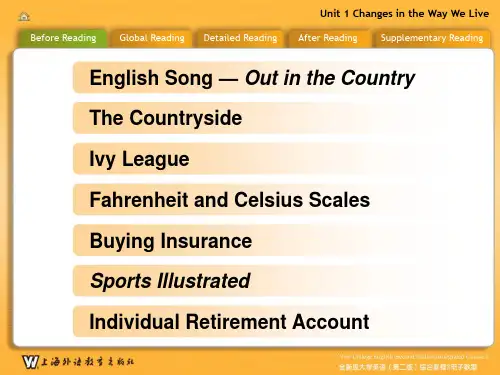
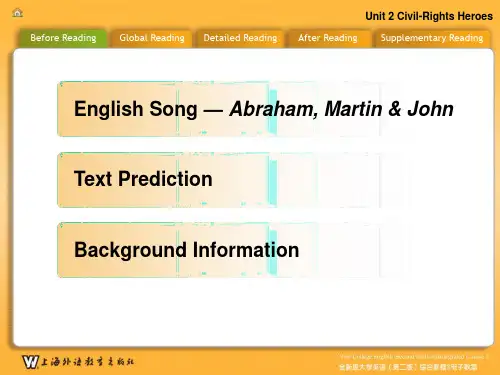

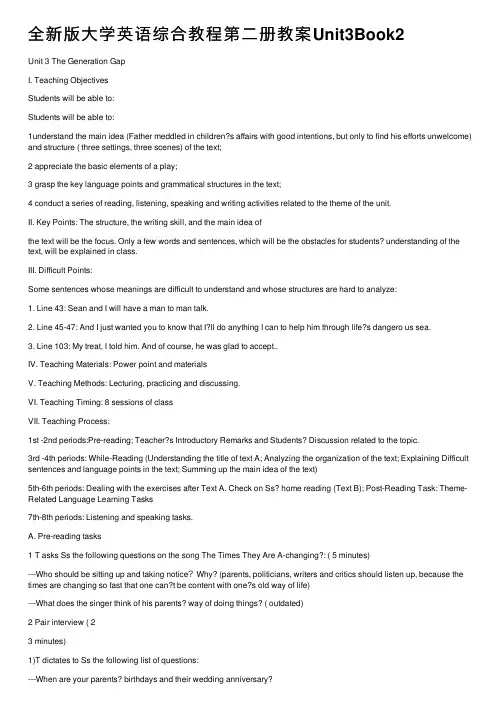
全新版⼤学英语综合教程第⼆册教案Unit3Book2Unit 3 The Generation GapI. Teaching ObjectivesStudents will be able to:Students will be able to:1understand the main idea (Father meddled in children?s affairs with good intentions, but only to find his efforts unwelcome) and structure ( three settings, three scenes) of the text;2 appreciate the basic elements of a play;3 grasp the key language points and grammatical structures in the text;4 conduct a series of reading, listening, speaking and writing activities related to the theme of the unit.II. Key Points: The structure, the writing skill, and the main idea ofthe text will be the focus. Only a few words and sentences, which will be the obstacles for students? understanding of the text, will be explained in class.III. Difficult Points:Some sentences whose meanings are difficult to understand and whose structures are hard to analyze:1. Line 43: Sean and I will have a man to man talk.2. Line 45-47: And I just wanted you to know that I?ll do anything I can to help him through life?s dangero us sea.3. Line 103: My treat, I told him. And of course, he was glad to accept..IV. Teaching Materials: Power point and materialsV. Teaching Methods: Lecturing, practicing and discussing.VI. Teaching Timing: 8 sessions of classVII. Teaching Process:1st -2nd periods:Pre-reading; Teacher?s Introductory Remarks and Students? Discussion related to the topic.3rd -4th periods: While-Reading (Understanding the title of text A; Analyzing the organization of the text; Explaining Difficult sentences and language points in the text; Summing up the main idea of the text)5th-6th periods: Dealing with the exercises after Text A. Check on Ss? home reading (Text B); Post-Reading Task: Theme-Related Language Learning Tasks7th-8th periods: Listening and speaking tasks.A. Pre-reading tasks1 T asks Ss the following questions on the song The Times They Are A-changing?: ( 5 minutes)---Who should be sitting up and taking notice?Why? (parents, politicians, writers and critics should listen up, because the times are changing so fast that one can?t be content with one?s old way of life)---What does the singer think of his parents? way of doing things? ( outdated)2 Pair interview ( 23 minutes)1)T dictates to Ss the following list of questions:---When are your parents? birthdays and their wedding anniversary?---Do your parents celebrate your birthday? How about their own birthday celebration?---In your parents? eyes, what are you interested in?---In your eyes, what are your parents interested in?---In what areas do your parents want you to improve?---In what ways do you want your parents to improve?---Tell of an instance when your parents and you disagree over something.2)Ss form pairs to interview each other. If there is an odd number of Ss in theclass, one group may consist of 3 Ss. The interviewer must note down the answer from the interviewee.3)Some Ss report interview results to class.3 T may lead in to Text A by saying: As we find from our interviews, parents and children do not often see eye to eye. When parents interfere with their children?s affairs, they believe that they are doing so in the interest of their children. However, the children may not be grateful, as is the case in the play we are going to study, Father Knows Better. When you read on, I want you to bear this questionin mind: despite their complaints, the Thompson children actually love their father very much. Do you yourself show similar attitudes towards your own parents?( 2 minutes)B. While-reading tasks1 A brief introduction to play ( 25 minutes)1)T writes down on the blackboard the major components of a play: characters,settings, stage directions, language, conflicts, climax, and theme.2)Ss identify the characters in this play.3)Ss read the directions for Text Organization Exercises 1 and 2, then scan theplay to divide it into three parts. T may drop a hint: just read the stagedirections put in brackets.4)T explains the functions of stage directions: to set up stage properties in theproper place; to indicate a change in setting; to direct actors? movements, gesture, facial expression, tone of voice, etc. Then T draws the followingillustration on the blackboard:5)T invites one S to read aloud Heidi?s speech to the audience at the verybeginning of the play, then ask another S to re-create Heidi?s words into a complete and grammatical paragraph. They may refer to Writing Strategy to see the stylistic differences between speech and writing.6)T defines conflicts as the essence of a play, a clash of actions, ideas, desires orwills. It may happen in three forms: man against man, man againstenvironment, man against himself. When a conflict develops to the mostintensified point, it becomes a climax. T asks Ss to find out the form(s) of conflict in this play as they later go through the text.7)T explains that, unlike a novelist or short-story writer, a playwright can notcome forward, interrupt the action, and tell the audience what he/she means by a certain scene or explain to them what is going on in the minds of the characters. The audience must conclude by themselves what theme of the play is. T tells Ss that they will do so at the end of reading this play.2 T explains language points in Part I and gives Ss practice ( see Language Study).( 15 minutes)3 Ss sum up the main conflict in Part I. ( 3 minutes)4 T explains language points in Part II and gives Ss practice ( see Language Study).( 25 minutes)5 Ss sum up the main conflict in Part II.( 3 minutes)6 T explains language points in Part III and gives Ss practice ( see Language Study). ( 15 minutes)7 Ss sum up the main conflict in Part III.( 3 minutes)8 Ss sum up the theme of the play. ( 6 minutes)C. Post-reading tasks1. The way they are (25minutes)1)Ss form groups of 3-4, re-read Part Ⅱ. Based on it, they will come up with abrief summary of the characteristics of Mother, Father, and the children (see Text Analysis). T may give Ss the following model:“Father shows great respect for Mother. He pulled the chair for her before dinner, and obeyed her commands like …do go on?, …do get on with it?, …don?t keep us in suspense?. Besides, although Father was pleased with what he had done for Diane, he had learned from experience that his efforts were not always welcome. That way why he could quickly realize his blunder, as made clear by sentence …I do? Yes, I guess I do. I?ve…done it again, haven?tI ??2)When Ss discuss within the group, the following questions might help:---- How did Mother address Father and her children?---- How many do?s and don?ts did she use? What do they tell about her character?---- On whose side Heidi and Sean stage whisper to each other?---- What did Sean tell Father that “I do believe Diane would like to know the surprise?”---- How did Diane feel when she said “Thank you, Sean. I owe you one”?---- What were Diane?s reactions during the scene?3)Several groups report their summaries to the class.2. T guides Ss through some after-text exercises. (25 minutes)3. T checks on Ss? home reading (Text B) (3 minutes)4. Ss so Part Ⅳ: Theme-Related Language Learning Tasks. (1 period)5. T asks Ss to prepare for the next unit: (2 minutes)1)do the pre-reading task;2)preview Text A.VIII. Assignments:Assignments for 1st and 2nd periods:Vocabulary Exercises I, II, III in Text A●Listen to the recording of the textAssignments for 3rd and 4th periods:●Review what have been learned in class●Comprehensive Exercises, I, II in Text A●Read the text fluently and imitate the pronunciation and intonation of therecordingAssignments for 5th and 6th periods:●Review what have been learned in class●Language Practice in Text B●Preparations for paragraph recitation and dictation of new words andexpressions in Unit 3Assignments for 7th and 8th periods:●Review what have been learned in class●Home listening: Task 1, 2 and 3●Previewing text A in Unit 4IX. Teaching Reflection:Try to listen to the feedback of the students during and after the course, analyze the weaknesses in teaching and improve the methods as much as possible.The feedback from the students:The methods taken to improve the teaching and learning:X. Appendix: Teaching Contents:A. Text AnalysisAlthough a playwright can?t come forward to speak directly readers, we may still form a mental picture of what each character is like.Let?s take Part Ⅱfor example. From the way they speak, their tone of voice, their facial expressions and their actions, we find Father, Mother and the three Thompson children life-like.Since a brief discussion of Father?s characteristics is given as a model in the Suggested Teaching Plan, here we will focus on Mother and the children.As we notice, in her speech Mother uses quite a number of do’s and don’ts, pleases, dears, and sweetheart’s. She is the real head of the Thompson household, giving out commands to her children as well as her husband. Moreover, most times her orders are respected. On the other hand, knowing her children?s attitude towards Father?s meddling, she tries to maintain the peace, as in the in stance when she maintains Father?s dignity by telling the children “Don?t interrupt”, “Don?t distract your father”, and “give your father the respect he deserves”, or when she tries to divert the conversation by talking about her dessert.The Thompson chil dren respect Mother, as shown by their frequent “Yes, Mother” and “Sorry, Mom”. On the other hand, they are used to Father?s meddling with their affairs. When Sean and Heidi find out that this time the bad luck had befallen Diane, they can afford to stand back and poke a few bemused comments. Diane?s feelings are entirely different, though. She is put on guard when Father tells her “I have a surprise for you.” Then she is embarrassed as Father mentions her feelings toward young Kyle. Later, as Father goes on delaying telling the truth, she becomes hysterical. Finally, when she learns the truth, she loses her temper.Isn?t it a wonder that words can tell so much about people?B. Cultural Notes1.Family life: Some families are very child-centered. The closest families eat meals at the same time and spend their free time together. Some families, however, only see each other for a short time in the evening, and though the children are still considered important, they have to fit in the lives of their parents.The average day for many families begins with getting the children up and ready for school. There is usually a rush for everyone to use the bathroom, find clean clothes, eat breakfast, and catch the bus. In the meantime the parents have to get ready for work themselves. Early mornings are a scramble for many families.The school day usually ends at about 3 p.m. in the US and 4 p.m. in Britain, and the working day at 5 p.m. or later, so many parents have to make arrangements for their children after school. They may go to an after-school center or stay with a neighbor?s children. Older children often do activities like sports or music at their school, or go home and do their homework. Children often also have to do chores.In many families, the children eat when they get home and their parents eat later. In the evenings the children play or go and see friends. If everyone is staying in they may watch television together. Many parents make an efforts t spend quality time with their children, an hour or so each day when they give them the full attention.American families are often criticized for the way they do things separately, though many people believe that it is good for children to learn to be independent. From an early age children are encouraged to decide what they want to do, eat or wear, and their parents try to respect their opinions.2. Part-time job: Many American teenagers earn a good portion of their college expenses by working during the summer as waiters or waitress, construction workers, mother? h elpers, gas station attendants, telephone operators or messengers. They are not concerned with status. Being unskilled, they try to find jobs at whatever level they can. They seek not only money, but also experience. They learn work habits, responsibility, the ability to take orders and to get along with a boss and different kinds of people.C. Language Study1. location n. a place or position 场所;位置e.g. With nesses showed the police the exact location of the accident.The school is going to move to a new location2. dine vi. eat dinner 进餐dine out having an evening meal away from home 外出进餐e.g. It?s Jan?s birthday, so we are dining out tonight at a special little restaurant we know.3. embarrass vt. make (Sib.) feel awkward or ashamed 使窘迫;使不好意思e.g. I chose my words carefully in order to avoid embarrassing anyone.It embarrassed him that he had to give a talk in front of a lot of people. adj. embarrassed: (sb.) shy, guilty or ashamed about sth.e.g. I was really embarrassed when I knocked the cup of tea over my teacher.4. dumb a. foolish; unable to speak 愚蠢的;哑的e.g. He was so dumb that he left his keys at home again.Don?t be dumb. You can?t get a loan from the bank if you are laid-off.Children born deaf and dumb can nowadays be taught to speak and lip-read.Martin was born dumb, but he has still managed to get a good job.5. unison n. ⼀致;齐唱;齐奏in unison acting in the same way at the same time ⼀致地;⼀起e.g. The children find it difficult to play their instruments in union.The international community is ready to work in unison against terrorism.6.consist vi. 组成,构成consist of be made up of 由…组成e.g. The book consists of essays written over the last twenty years.The committee consists of scientists and engineers.7. palm n. (1)⼿掌;掌状物(2)棕榈树vt. 把---藏于⼿(掌)中palm off to persuade someone to accept sth. because you do not want it and it has no value⽤欺骗⼿段把---卖掉e.g. She tried to palm her old car off on me.她设法骗我买下她那辆旧车。
全新版大学英语综合教程3(第二版)课后答案解析全集简介《全新版大学英语综合教程3(第二版)》是一本适用于大学生的英语综合教材,旨在帮助学生提高英语听说读写能力。
本文档提供了此教材中课后习题的答案解析,为学生提供了方便和参考。
目录1.第一单元:单词与短语学习2.第二单元:听力训练3.第三单元:阅读理解4.第四单元:语法与词汇5.第五单元:写作训练6.第六单元:听力训练7.第七单元:阅读理解8.第八单元:语法与词汇9.第九单元:写作训练10.第十单元:听力训练…(省略部分单元)第一单元:单词与短语学习1.1 词汇选择1.A2.B3.A4.C5.B解析: - 1. A选项符合句意,表示某物“连在一起”。
- 2. B 选项符合句意,表示“建立/创立”。
- 3. A选项符合句意,表示“表达”。
- 4. C选项符合句意,表示“有目的的”。
- 5. B选项符合句意,表示“应急”。
1.2 短语选择1.C2.A3.B4.B5.A解析: - 1. C选项符合句意,表示“追赶”。
- 2. A选项符合句意,表示“从……出来”。
- 3. B选项符合句意,表示“辨认出”。
- 4. B选项符合句意,表示“犯错误”。
- 5. A选项符合句意,表示“不久”。
第二单元:听力训练2.1 听对话,选择正确答案1.B2.A3.C4.B5.B解析: - 1. B选项符合对话内容,表示原来他们“想要去参观”。
- 2. A选项符合对话内容,表示她们“去看医生”。
- 3. C选项符合对话内容,表示他们“在机场见面”。
- 4. B选项符合对话内容,表示他会“坚持下去”。
- 5. B选项符合对话内容,表示他喜欢“阅读”。
2.2 听长对话,回答问题1.Yes, the woman does like coffee.2.The woman prefers tea to coffee.3.The woman will have a cup of tea.4.The woman has a cup of coffee every morning.5.Yes, the woman has had coffee before.解析:- 1. 对话中女士提到她喜欢咖啡,所以答案为“Yes”。
全新版大学英语综合教程2第二版Unit3电子课件BR-main BR1.1_bob dylan1 BR1.1_bob dylan2 BR1.2 BR_comedy BR3_fast food1 BR3_fast food2 BR4_main BR4_introduction1 BR4_introduction2 BR4_High School In United States BR4_High School In Canada BR4_High School In Australia BR5_warm-up1 BR5_warm up2 GR-main GR1_part division of the text GR2-for part1_1 GR2-for part1_2 GR2-for part2_1 GR2-for part2_2 GR2-for part2_3 GR2-for part2_4 GR2-for part2_5 GR2-for part2_6 GR2-for part3 GR2-for part3_popwin_group Article1 Article2 Article3 Article4_S Article5_S Article6_S Article7 Article8 Article9_S Article10 Article11_S Article12 Article13_S Article14 Article15 Article16_S Article17 Article18 Article19 Article20_S Article1_S_Popwin_father know better Article1_W Article1_W_popwin_location Article1_W_popwin_knows better Article2_W Article2_W_Popwin_embarrassing Article2_W_popwin_dumb Article3_W Article3_W_POPWIN_in unison Article3_W_popwin_consisits of1 Article3_W_popwin_consisits of2 Article3_W_popwin_consisits of3 Art icle3_W_popwin_consisits of4 Article4_S_popwin_I’m sure… Article5_S_popwin_and I assusure you… Article6_S_popwin_If that sort of… Article6_W Article6_W_popwin_fade Article6_W_popwin_overall Article6_W_popwin_trade for Article7_W Article7_W_Popwin_keep insuspense Article8_W Article8_W_interrupt Article8_W_bet1 Article8_W_bet2 Article8_W_distract Article9_S_popwin_Through clenched… Article11_W Article11_W_Popwin_glorious Article11_W_Popwin_hand down1 Article11_W_Popwin_hand down2 Article12_W Article12_W_Popwin_community Article12_W_Popwin_narrow down Article12_W_Popwin_at any rate1 Article12_W_Popwin_at any rate2 Article12_W_Popwin_at any rate3 Article13_S_POPWIN_Why back… Article13_S_POPWIN_Get this over… Article13_W Article13_W_exhausted1 Article13_W_exhausted2 Article13_W_repeatedly Article14_W Article14_W_Popwin_swallow Article15_W Article15_W_popwin_frank Article16_S_Popwin_And it’s not just… Article16_W Article16_W_Popwin_interference Article16_W_Popwin_constant: Article17_W Article17_W_Popwin_in charge of Article18_W Article18_W_Popwin_exception Article18_W_Popwin_fill out1 Article18_W_Popwin_fill out2 Article18_W_Popwin_proof Article19_W Article19_W_Popwin_junior1 Article19_W_Popwin_junior2 After reading-Main eful-1 eful-2 eful-3 eful-4 After-2_sentences translation1 After-2_sentences translation2 After-3_Spot Dictation 1 After-3_Spot Dictation 2 After-4-Discussion After-5-Talk about the Pictures After-6_Writing Practice1 After-6_Writing Practice2 After-7. Proverbs and Quotations 1 After-7. Proverbs and Quotations 2 After-7. Proverbs and Quotations 3The lights quickly fade to black and then come up a second or two later. DIANE stands alone at the Down Right edge of the stage. HEIDI and SEAN enter Down Left and cross to the edge of the stage. DIANE: Can you imagine how humiliated I was? An honor student, class president. And Father was out asking people to have their sons call and ask me to the prom! But that’s dear old dad. Actually, he i s a dear. He just doesn’t stop to think. And it’s not just one of us who’ve felt the heavy hand of interference. Oh, no, all three of us live in constant dread knowing that at any time disaster can strike because: Translate the sentence into Chinese. 不止我一个人深受他横加干预之苦。
1)我们的计算机系统出了毛病,但我觉得问题比较小。
(minor)2)父亲去世时我还小,不能独立生活。
就在那时,家乡的父老接过了养育我(my upbringing)的责任。
(at that point)3)这些玩具必得在达到严格的安全要求后才可出售给儿童。
(requirement)4)作为新闻和舆论的载体(carrier),广播和电视补充了而不是替代了报纸。
(supplement, rather than)5)至于这本杂志,它刊载世界各地许多报章杂志上文章的摘要。
(digest, when it comes to ...)1) We have a problem with the computer system, but I think it's fairly minor.2) My father died when I was too young to live on my own. The people of my hometown took over (responsibility for) my upbringing at that point.、3) The toys have to meet strict/tough safety requirements before they can be sold to children.4) Radio and television have supplemented rather than replaced the newspaper as carriers of news and opinion.5) When it comes to this magazine, it is/carries a digest of articles from many newspapers and magazines around the world1)无论是在城市还是在农村,因特网正在改变人们的生活方式。
全新版大学英语第二版综合教程3电子教案
全新版《大学英语》教案
课程名称:大学英语(一级)
专业:本校05普通本科
年级:2005
学期:第一学期
任课教师:全新版《大学英语》板块任课教师
编写时间:2005年9月
1.教学内容及学时分配
Time allotment.
1st period:reading;text organization.
2nd period:while reading.
3rd period:post reading activities.
4th period:reading practice.
5th period:speaking.
6th period:writing.
2.教学重点及难点
important language points in the text.
3.教学内容的深化及拓宽
Students conduct a series of reading,listening,speaking and writing practice to deepen their.
understanding of the points taught in class.
4.教学方式及在教学中应注意的问题
A combination of traditional teaching methods with the communicative approach will be adopted.Special attention should be paid to classroom interaction.Give students time to adapt to the new teaching mode in the university that are quite different from the one they were used to in the middle school.More encouragement is needed and more guidance will be given to them in their extracurricular study.。